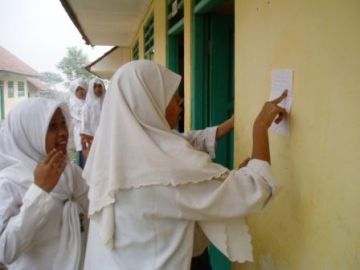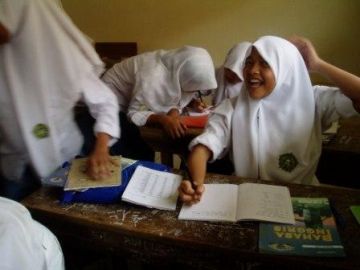An Australian teacher trainer learns a lesson (or two) in East Java
Louise Blair
An active classroom
|
The Australian government currently supports a number of programs that aim to increase skill levels of teachers in Indonesia and promote cross-cultural exchange. These programs offer exciting opportunities for those looking to expand their horizons. But how prepared are teachers from Australia in taking up this challenge?
Towards the end of a year-long teaching contract in China, I began scouting around for my next adventure. On the internet I found an advertisement for teacher trainers for the Islamic Schools English Language Program (ISELP) in Indonesia. One of the goals of this program was ‘to increase the proficient use of best practices in English language teaching and learning’.
This, I knew, would be a challenge! Education institutions in Indonesia commonly employ traditional teaching methodologies such as rote learning and text translations. These methods are poles apart from what is currently considered best practice in English language teaching.
Working at a pondok pesantren
I was selected to join the program and was placed in a pondok pesantren (Islamic boarding school) in East Java for 18 months. My brief was to work with junior high school English teachers and assist with the implementation of the new national competency based curriculum introduced in 2004. Other program goals included raising the English language proficiency levels of teachers and promoting cross-cultural exchange.
Pondok pesantren are a cheaper alternative to public sector schooling. Established and led by a kyai (religious teacher), pesantren aim to provide both general and spiritual education in a family-like atmosphere. While most students board, a significant number are day students, especially if they live nearby.
A pesantren can comprise several schools, representing primary, junior and senior secondary levels. In addition to divisions due to educational stage, pesantren commonly offer both the curricula of the Department of Religion and the Department of National Education. For example, at the junior secondary level students can select to follow the Madrasah Tsanawiyah stream (the Department of Religion curriculum) or the Sekolah Menengah Pertama stream (the Department of National Education curriculum). Initially this complex system took a while to work out.
Within the pesantren where I was posted, each school had its own administrative staff, headmaster and deputy headmaster. Teachers sometimes work across the schools, despite different timetabling systems. From an outsider’s perspective, it seemed quite hierarchical. Decisions were made at the top and passed down through layers of administration to those at the bottom. Information did not always reach those who needed it. And positions of leadership for women were largely confined to the primary sector.
Tools for teaching
Teachers in Australia can expect a certain level of resourcing in terms of access to equipment such as computers and photocopy machines, library resources, and teaching support materials. In comparison, teachers at pesantren are thinly resourced. They are expected to pay for their own photocopying, and then recoup the money from the students. Because the school photocopier was broken throughout my 18 month placement, teachers had to travel to the nearby town for photocopying. Library resources were non-existent, and there was very little in the way of teaching support materials.
Pesantren management often choose to spend limited resources on symbolically valuable items. Language laboratories, a big ticket item, are a popular purchase. They feature in promotional brochures and help create an image of the pesantren as a modern institution with state-of-the-art technology. But their educational value was limited. Half a dozen portable CD players or even a small computer lab would have wider cross-curricular application. But despite limited application, language laboratories continue to pop up in pesantren, even though there is no money to mend existing broken equipment.
In the classroom, English teachers use student workbooks often chosen by the principal. These are purchased from visiting booksellers and are very cheap – around Rp4000 (about 50 cents) for one semester. Unfortunately, the low price is reflected in the quality of the texts, which contain numerous errors. Good quality texts are available, but at around Rp25,000 (A$3) for a year, they are considered too expensive for the students.
For teachers, many of whom have never seen the curriculum, the workbook provides some level of guidance. Despite being trained practitioners, pesantren teachers receive a much lower wage than their government school counterparts. Many work seven days a week in two or more jobs to make ends meet. The cost of supplementary materials and the time burden of lesson planning mean that teachers are often dependent on the workbook. The standard practice is for each class to work its way through the text, learning the vocabulary and set dialogues and translating each passage into Indonesian – the hallmarks of a passive approach.
An active classroom
 |
Students doing a running dictation exercise
|
As the workbook was the main resource for teachers, my challenge was to use this resource in active and innovative ways. The teachers I worked with were very enthusiastic about learning and trying out new ideas. They tested out running dictation and jigsaw reading activities, which the students found much more enjoyable than translation exercises.
A key task was to find practical ideas that both motivated students and required little preparation or resourcing. Teachers taught large classes (around 40 students) often in crowded, poorly maintained classrooms with the barest minimum of equipment. At first, teachers commented on how unmotivated students were to learn English, but as time went on more reported the small successes they were achieving in the classroom, especially in terms of increased student motivation.
In addition to new teaching methodologies, teachers were increasingly able to arm themselves with more teaching resources. A key component of the program was to build up a bank of teaching resources that supported a more communicative approach to learning English, and that required minimal preparation or photocopying. By buying a laminator we could create reusable teaching resources.
We established a centre to house these new resources. This raised a new set of problems. Libraries are virtually non-existent in many pesantren, and there is no ‘borrowing’ culture. Teachers constantly had to be chased up to return borrowed materials. There was a sense that once you got your hands on something, you held on to it.
A learning journey
Most of the teachers were very keen to participate in professional development activities. Workshops about teaching methodologies and planning sessions were reinforced by team teaching and demonstration lessons. These lessons were an important component of the program, as they provided teachers with the opportunity to see the ideas presented during workshops in action and to practise new ideas in a supportive environment.
I learned as much about the intricacies of my own culture as I did about Indonesia
For me, working in a different cultural context meant stepping outside my comfort zone to some degree. Although it was a challenge learning to adapt to such a different working environment, there were many rewards on both professional and personal levels. Perhaps one of the most valuable professional lessons was how to live without a photocopy machine! (Most teachers in Australia feel their right arm has been cut off if they don’t have access to such piece of equipment). Upon returning to the classroom in Australia, I felt somewhat overwhelmed by the choice of equipment and resources available. I had become quite comfortable with working with minimal resources; in Java there was a sense of freedom in being less reliant on technology.
On a more personal level, it was a rewarding experience to discover new ways to communicate and negotiate with people. In Australia we are used to being direct in our communications with each other, but this is generally viewed as impolite in Indonesia. As I learned to be more indirect in expressing my ideas or requests, I found I was better understood by others and vice versa. There were fewer instances of ‘miscommunication’ based on cultural differences.
During my time working in Indonesia, I found I learned as much about the intricacies of my own culture as I did about Indonesia’s. The ability to be flexible and maintain an open mind are key factors when engaging in cross-cultural programs, as is a willingness to listen and learn from those around us. Before leaving Australia, I felt confident that my level of cultural knowledge, Indonesian language ability and experience teaching abroad ensured a reasonable degree of preparedness. Looking back I can see that I was only part of the way there. The reality was that after 18 months in-country, I was still learning as much as I was teaching. ii
Louise Blair (louisebl2004@yahoo.com.au ) currently teaches ESL in Brisbane. Between July 2005 and December 2006 she worked on the Islamic Schools English Language Program at Pasuruan, East Java. This program was funded by AusAID and managed by Australian Volunteers International.












